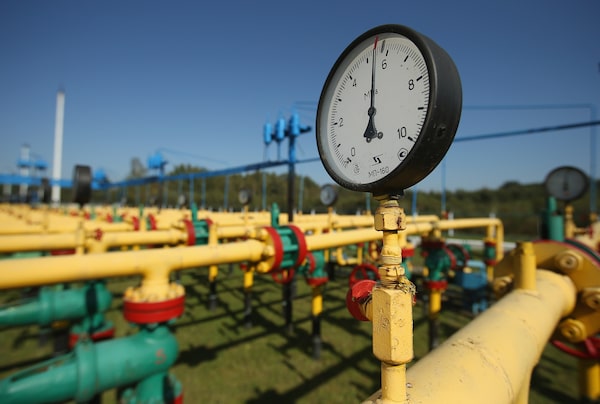
A pressure gauge stands on a pipe at the Dashava natural gas facility on Sept. 18, 2014 in Dashava, Ukraine. The country was the principal gas-producing region of the Soviet Union until the late 1970s.Sean Gallup/Getty Images
Ukraine’s state-owned oil and gas company, Naftogaz, is making a sales pitch to Canadian energy companies: Send your technology, expertise and investments to help the country fully develop its natural gas reserves, in turn bolstering global energy security.
Just days ago, the European Union agreed to a phased embargo on Russian crude in response to the country’s invasion of Ukraine. As a result, 90 per cent of Moscow oil will be banned in Europe by 2023, says Ukraine’s new ambassador to Canada, Yulia Kovaliv – “a significant challenge” for the bloc, but an opportunity for Canada and other allies.
Ukraine was the principal gas-producing region of the Soviet Union until the late 1970s. Technical studies over the past year have identified even more natural gas deposits, which Naftogaz says could lead to the drilling of thousands of horizontal wells.
Russian oil embargoes: What Europe doesn’t take, others will
Russia says it can re-route oil exports to minimize losses from EU embargo
This method of extraction would help boost natural gas production rapidly. The result, Naftogaz says, could be a huge fossil fuel play on a scale similar to Western Canada’s Montney or Duvernay regions.
“The potential is massive,” Oleg Tolmachev, director of Naftogaz’s exploration and production division, told The Globe and Mail on Wednesday.
“We’re actually going to start drilling this year; war or no war, we’re going to start. But in order for us to get into the full swing of things, it’s probably three years.”
He said he believes Naftogaz will be able to tap a resource large enough to meet Ukraine’s own energy needs and start exporting to the EU. The bloc is working to wean itself off Russian oil and gas supplies in an attempt to squeeze Moscow’s bottom line and undercut the revenues it is using to finance the war.

A young woman holds a sign urging an embargo on Russian oil and gas during a protest in Berlin, Germany, on June 5.SeanGallup/Getty Images
“What we need right now are partnerships – operational, technological and investment partnerships – with Canadian and U.S. companies that can allow us to shortcut the learning curve,” Mr. Tolmachev said.
Alberta Energy Minister Sonya Savage met with Ambassador Kovaliv and Naftogaz executives on Wednesday morning at the Global Energy Show in Calgary, where the group outlined its sales pitch over breakfast.
Afterwards, Ms. Savage told The Globe that Canada’s energy sector has “a moral imperative to help” the beleaguered country develop its natural gas reserves.
She doesn’t yet know what it might take to get Alberta companies on board, but committed to kickstart possible provincial incentives or encouragement, and to approach Ottawa for support.
“We need to do whatever we can to help [Ukraine]. It will help them rebuild after the war and it will help energy security globally,” she said.
Naftogaz usually meets about 70 per cent of Ukraine’s natural gas needs.
But its production has been dramatically impacted by government-implemented restrictions on diesel consumption, the destruction or damage of gas transmission infrastructure and logistical problems that cropped up when the company had to start sourcing equipment from Europe rather than Russia.
Still, several hundred employees continue to live and work at production facilities behind the front lines, Mr. Tolmachev said. They’re provided food by nearby villagers and, most days, are shelled by artillery.
Drivers wait in line for fuel in the eastern Donetsk region near Kramatorsk, Ukraine, on June 7.FINBARR O'REILLY/The New York Times News Service
“People go into shelter, they come out and go back to work in the wells because they understand that if they don’t do it, then the nation will suffer in terms of not being able to keep homes running gas stoves, running critical infrastructure,” Mr. Tolmachev said.
And while missile strikes recently destroyed Naftogaz’s main refinery, broader company operations have continued. Just three weeks ago, for example, the company commissioned a landfill biogas-cogeneration facility, and it’s expanding its solar and wind power assets.
Transitioning to those cleaner forms of energy is key, Ms. Kovaliv told the Global Energy Show, adding that it would be “a missed chance” if companies did not reinvest profits from high fossil fuel prices into sustainable energy sources.
But even as the world pursues more green energy, Mr. Tolmachev noted that gas prices in Europe will remain high for the foreseeable future – which he hopes will attract North American companies to the country.
“There are political risks, there are war risks. But at the same time, the reward is just enormous,” he said.
“The war’s going to be over and it’s not going to be years. So we are going to start going down the line of proving up this concept, this idea, by doing the drilling ourselves regardless.”
Ms. Kovaliv said global unrest around oil and gas supplies means European markets “are now open for the new entrants in all centres of the energy supply.”
“It’s the right time to do this. Replacing Russian energy in Europe is crucial to decrease Russia’s revenues and the ability to wage the war,” she said.
“And Canadian companies we think should take an opportunity to enter and expand in the EU market.”
Your time is valuable. Have the Top Business Headlines newsletter conveniently delivered to your inbox in the morning or evening. Sign up today.
 Emma Graney
Emma Graney